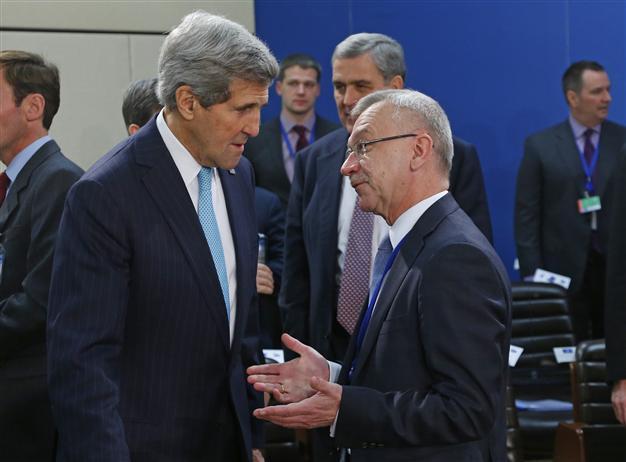Ukraine, rebels ‘agree in principle’ on ceasefire in Lugansk: OSCE
KIEV - Agence France-Presse

Ukrainian Ambassador to NATO Dolhov talks with U.S. Secretary of State Kerry at a NATO foreign ministers meeting in Brussels, Dec. 2. REUTERS Photo
Ukraine and pro-Russian rebels have “agreed in principle” on a ceasefire in the eastern war-torn region of Lugansk, the OSCE has said, as NATO foreign ministers met in Brussels Dec. 2 aiming to plot a new course on the country.“All agreed in principle to a total ceasefire along the entire line of contact between Ukrainian Armed Forces and those under control of the [Lugansk People’s Republic], to be effective from Dec. 5,” the Organisation for Security and Cooperation in Europe said in a statement released in the late hours of Dec. 1.
“They also agreed that the withdrawal of heavy weapons would start on 6 December,” the statement added.
Lugansk separatist chief Igor Plotnitsky told the Interfax-Ukraine news agency that the talks were held on Nov. 29 and produced a deal to establish a military buffer zone.
The cordon “will be 15-20 kilometers wide,” Plotnitsky said.
The two sides signed a Russian-brokered truce on Sept. 5 in the Belarussian capital Minsk that helped stem some of the bloodiest fighting but it has been frequently broken and followed by hundreds of deaths on both sides.
The heaviest battles now rage around the devastated airport of the main rebel-held city of Donetsk, center of the self-proclaimed Donetsk People’s Republic that also proclaimed independence from Kiev.
Fighting has intensified at the airport in recent days, but a separatist source told AFP that a new round of negotiations about a broader Donetsk ceasefire was set begin yesterday afternoon.
The Ukrainian military announced on Dec. 1 that a temporary truce had been agreed for the territory surrounding the Donetsk airport, although an AFP reporter heard heavy shelling in the area on Tuesday morning.
The rebel source said the negotiations would involve senior Ukrainian military figures and General Alexander Lentsov – the deputy head of the Russian ground forces.
Meanwhile, U.S. Secretary of State John Kerry and other ministers from the 28-nation group discussed Dec. 1 how to “drive our alliance forward in a changing world,” as new NATO chief Jens Stoltenberg put it.
Stoltenberg said he expected four outcomes from the meeting: an agreement on boosting forces in the east to counter a rising Russia; a deal on an interim NATO quick reaction force; more support for Ukraine; and to sign off a deal on a support mission in Afghanistan.
He insisted NATO would continue to back Ukraine and pressed Russia to live up to its commitments after it backed a ceasefire and peace plan agreed between Kiev and pro-Moscow rebels in the Belarus capital Minsk in September.
“The challenge is that the separatists and Russia are not respecting” the Minsk accords, he said as he arrived for the meeting at NATO’s Brussels HQ.
Moscow denies helping the separatists in eastern Ukraine and sees the West as trying to undermine Russia’s rightful influence in the former Soviet bloc.
The Russian foreign ministry issued a furious statement on Dec. 1 accusing NATO of “trying to destabilise the world’s most stable region” by sending extra defences into countries such as the three tiny Baltic states.
But the diplomatic standoff comes with Ukrainian President Petro Poroshenko – a pro-Western leader who won a May election vowing to reunite his crumbling state – facing growing domestic condemnation over the climbing toll of the war.
















